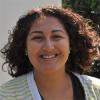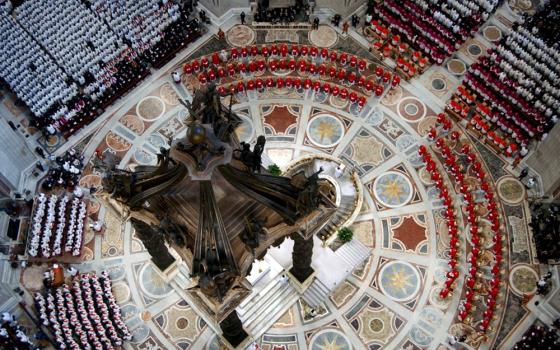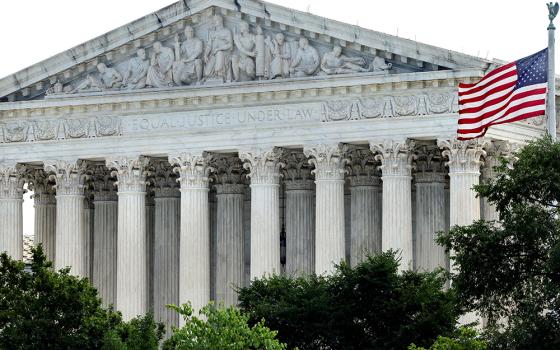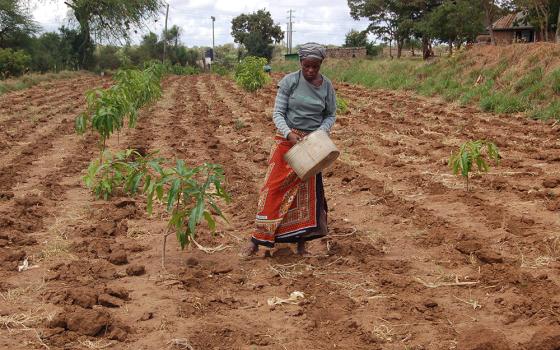Ever since I was very young I have had a strong connection with God. My family is not religious, yet I have not doubted God's existence and have sought out strong communities of faith and spiritual mentors since my youth. In high school I was relieved when I was finally able to drive so that I could regularly attend Mass since until then I could only go to Wednesday night religious education classes.
My career as a lay minister thus far has been life-giving, with many blessings along the way. But there has also been a tug to ordination that I have suppressed since I was a girl. I want to be someone my family is proud of and does not cause trouble. My call has felt like a terrible pit in my stomach, and I realized that my being hesitant to respond to the call to ordination from an early age is weaved with shame of my body as a woman. This fear and shame of my call eventually moved to a sense of unworthiness that has made me throughout my ministry second-guess my own judgment. I eventually shifted from humble service to timid leadership, which left me feeling inadequate and resentful of my brothers in ministry.
I went to college at a small liberal arts university. Historically a women's college run by sisters, it became coed in the 1960s. When I was there, many of the women no longer worked at the university, but their motherhouse was my home base and the place to return to at the end of ministry. The motherhouse was attached to the school, and so I grew in relationship with many women who were either in administration for their community or retiring near the end of their ministry. These amazing women allowed me to grow into an adult faith, broadening my image of God, seeking justice and, especially, women's ways of knowing. For many students they were "cute little old nuns" who lived next door to the college, but I sought them out: Sister Therese as my spiritual director, another as my advisor to my thesis project, and I interned under Sister Durstyne working on social justice and interfaith initiatives in the local and greater area. I came to know the stories of women like Sister Rene and her companion, who were sent to the Dominican Republic. One day they went for a mid-afternoon walk and came alongside a funeral procession, only to be changed, to never return to the United States but to stay and accompany the community, empowering the people there through education and creating a school, a park and a clinic.
I was in awe to witness that the sisters had lived amazing full lives; they saw things in me that I was terrified to explore. They empowered me to serve in ministry as a college student, even though they were far more capable. I had so many opportunities to lead walking next to them and am still in awe of their ability to dance in solidarity with me -- being in the front when necessary, getting out the way when someone else could take the reins. Their leadership was a living example that still calls me to critical examination of how to live.
What spoke most significantly to me was that as a Catholic religious community they chose Rev. Linda Farley to pastor their congregation. They decided that as the order of preachers they needed to hear preaching from an ordained woman on a regular basis, and therefore they chose a woman outside of the Catholic church to pastor them. They continued to call Catholic priests to say Mass for the congregation. Their witness held and honored so much in this third way. At a time when the church was struggling over women's roles in leadership, some demanding strict adherence to church doctrine and others choosing to leave, these sisters honored the Spirit and explored their own faith with a pastor they chose, honoring the church teachings through regular Masses without making demands directly. They stood witness not only for their congregation, but also for others in the community like me to widen our sense of Christianity, ecumenism and solidarity.
After a traumatic bitter end in ministry a few years ago, I decided to seek out a female pastor. I took six months off from ministry to heal and discern, ultimately deciding to continue ministry in higher education in Chicago while finding a new United Methodist Church plant, for worship and to serve me. My pastor's unwavering commitment to seeing and sanctifying wholeness calls me to boldly answer my call. My commitment to radical inclusion is rooted in the Gospel and is informed by my own experiences of discrimination. My experiences of church previously were often inclusive in language -- but not in experience -- for people of color and people of the LGBT community. This has been a place of healing, hope and accountability in the best sense for many, including myself.
I feel a profound grace in the ministry my pastor, Brittany, provides our community through living into her call -- providing healing, offering strength, and, especially, calling me forth as a leader in our church. I am deeply impacted by Brittany's living testimony, as she celebrates the Eucharist weekly and when she visited me in the hospital when I gave birth to my daughter, Miriam, and baptized her into a community that looks forward to the ways she will one day minister alongside us. I am called to ordained ministry from a place of humility, inviting vulnerability into my relationship with Jesus, how we are called to partnership, and intimately invited into the love and care of a Savior. My studies as a seminarian have only just begun, but I am confident that the education and university ministry will allow me to walk boldly, offering grace, love and reconciliation to our world as an elder of the United Methodist Church.
[April Gutierrez is a graduate of Boston College's School of Theology and Ministry and was previously a campus minister for First-Year Experience at Loyola University Chicago.]
Editor's note: We can send you an email alert every time a Young Voices column is posted to NCRonline.org. Go to this page and follow directions: Email alert sign-up.





